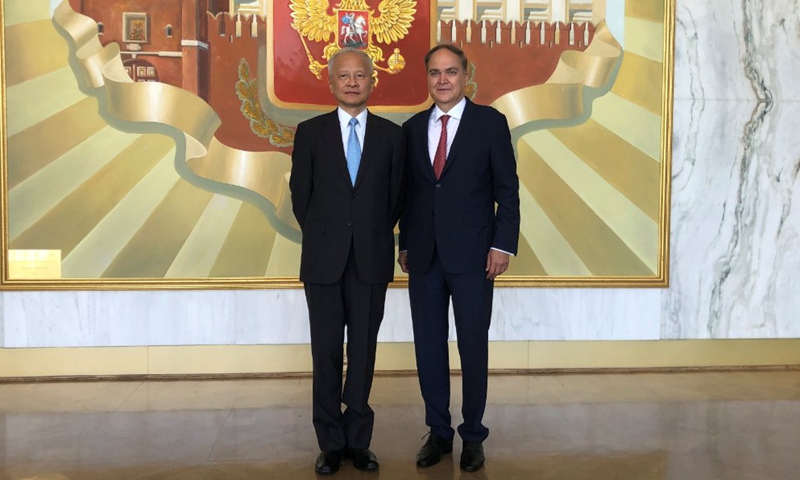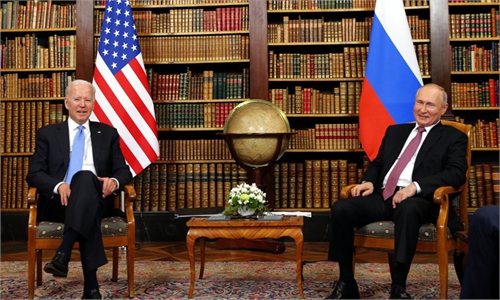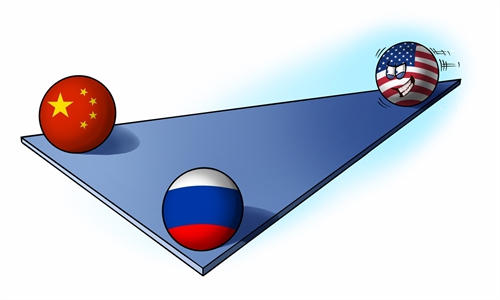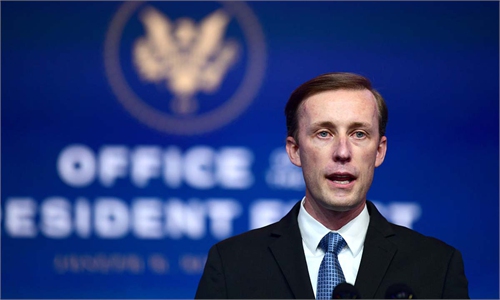Chinese, Russian envoys meet after Putin-Biden summit
Moscow transparent with Beijing on its ties with Washington: expert

Chinese Ambassador to US Cui Tiankai (left) meets with Russian Ambassador to US Anatoly Antonov on Monday. Photo: Twitter of Russian Embassy to US
One day after returning to his post in Washington DC, Russian Ambassador to the US Anatoly Antonov on Monday briefed Chinese Ambassador to the US Cui Tiankai on the Russia-US summit held in Geneva on June 16 and discussed wider topics about China-Russia relations ahead of Cui's planned departure from the US after eight years of service as the envoy.The meeting demonstrated Russian transparency with China, especially on its relations with the US, observers said, noting China and Russia have close communication at all levels and high-level mutual trust, which is a model of how major country diplomacy should be, in contrast to the Biden administration's coercive policies that lack a broad vision of current international relations.
Antonov and Cui spoke in favor of developing the strategic partnership and friendly nature of the two embassies in the US, in addition to the mid-June Russia-US summit, according to the Russian Embassy.
The Monday meeting was held at Antonov's initiative, though he arrived by plane late on Sunday night, TASS reported on Tuesday. Antonov returned to Moscow for consultation in late March amid diplomatic spats. It was agreed at the Putin-Biden summit that Russia and the US would allow their respective ambassadors to return to the two countries.
Antonov told the media that "I would be glad to meet with my Chinese colleague, a friend, and talk about the problems in Russia-US relations" and he asked Cui for his views on the prospects of China-US relations.
"No one will be ever able to drive a wedge between us because Russia and China have a strategic partnership and friendly relations," Antonov said.
Lü Xiang, a research fellow in US studies at the Chinese Academy of Social Sciences in Beijing, told the Global Times on Tuesday that the Russian envoy's invitation to meet and his frank attitude showed Russian transparency on its relations with the US in front of China.
It does not want to give room for speculation on Russia-US trade-offs at the summit, which outsiders had anticipated before the event, as the US wanted to concentrate its resources to deal with China, Lü said.
The meeting between the two ambassadors again underscored the China-Russia "rock solid" ties, high-level mutual trust, and bilateral consensus on a wide range of topics, which have been reinforced via repeated communications at different levels, the expert said.
US President Joe Biden attempted to cause discord between China and Russia via the leaders' summit, but when that turned out to be impossible, the US ramped up its attacks on the two countries.
US National Security Adviser Jake Sullivan said at a media event on Sunday that the US was preparing "another package of sanctions" against Russia over arrested anti-government blogger Alexey Navalny.
As to China, Sullivan urged further COVID-19 source tracing, even though WHO experts have already conducted research in China. Sullivan said China would risk international isolation if it does not cooperate.
Shi Yinhong, an expert on International Relations at Renmin University of China, told the Global Times that the US cannot instigate discord in China-Russia relations because the two countries stand together strategically amid the US' confrontational policies.
China and Russia have seen that even if the US offers "favorable conditions," they are just symbolic and temporary trade-offs, as the Biden administration will not relax its attacks against either country, Shi said.
Lü pointed out the Biden administration's dealing with China and Russia appeared to be lacking an overall design but merely involved petty work and small tricks, showing the foreign affairs team needed a broader vision and understanding of current international relations.
It also demonstrated how the world's major countries should interact and cooperate based on mutual trust and respect, instead of Washington's "coercion of allies" to achieve its goals, the expert said.
Amid US' attempts to rally allies to tackle both China and Russia, the two Eurasian countries, despite the inconvenience caused by the pandemic, have maintained close communications and coordination.
Russian Foreign Minister Sergey Lavrov visited China and met with Chinese State Councilor and Foreign Minister Wang Yi in March right after the China-US "2+2" dialogue in the state of Alaska.
On May 18, top leaders of the two countries witnessed the groundbreaking ceremony of bilateral nuclear energy cooperation projects together via a video link.
Yang Jiechi, a member of the Political Bureau of the Communist Party of China (CPC) Central Committee and Director of the Office of the Foreign Affairs Commission of the CPC Central Committee, visited Russia from May 24-27 to hold the 16th round of China-Russia strategic security consultations.
Chinese Foreign Ministry spokesperson Zhao Lijian has referred to the strategic partnership of coordination for the new era as "all-dimensional" and "all-weather." "The sky is the limit for down-to-earth China-Russia cooperation," Zhao said at an earlier press conference.
When the US shouted threats while leaving chaos in Afghanistan and Iraq, and failed to solve the Korean Peninsula issue, like a bad student in elementary school, China and Russia acted as responsible major countries, and their stable and close coordination acted as the strongest fortress to protect regional security, observers said.



